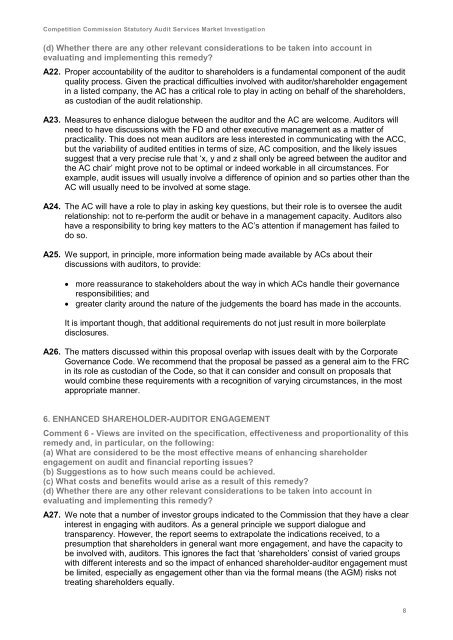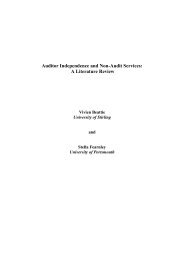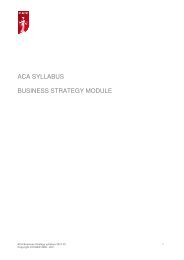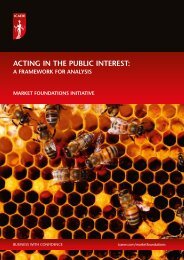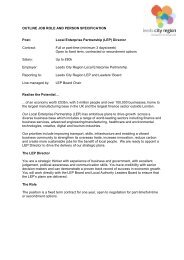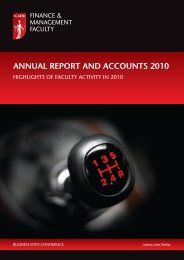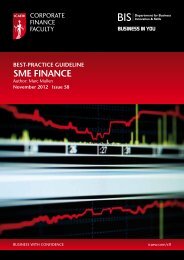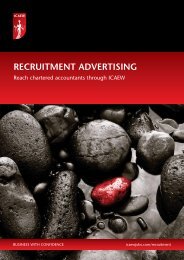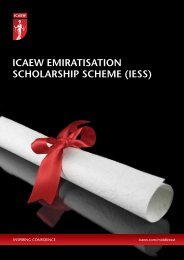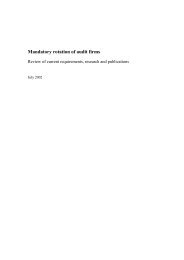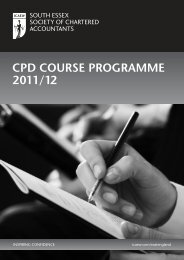ICAEW REP 46/13 Competition Commission Statutory Audit ...
ICAEW REP 46/13 Competition Commission Statutory Audit ...
ICAEW REP 46/13 Competition Commission Statutory Audit ...
You also want an ePaper? Increase the reach of your titles
YUMPU automatically turns print PDFs into web optimized ePapers that Google loves.
<strong>Competition</strong> <strong>Commission</strong> <strong>Statutory</strong> <strong>Audit</strong> Services Market Investigation(d) Whether there are any other relevant considerations to be taken into account inevaluating and implementing this remedy?A22. Proper accountability of the auditor to shareholders is a fundamental component of the auditquality process. Given the practical difficulties involved with auditor/shareholder engagementin a listed company, the AC has a critical role to play in acting on behalf of the shareholders,as custodian of the audit relationship.A23. Measures to enhance dialogue between the auditor and the AC are welcome. <strong>Audit</strong>ors willneed to have discussions with the FD and other executive management as a matter ofpracticality. This does not mean auditors are less interested in communicating with the ACC,but the variability of audited entities in terms of size, AC composition, and the likely issuessuggest that a very precise rule that ‘x, y and z shall only be agreed between the auditor andthe AC chair’ might prove not to be optimal or indeed workable in all circumstances. Forexample, audit issues will usually involve a difference of opinion and so parties other than theAC will usually need to be involved at some stage.A24. The AC will have a role to play in asking key questions, but their role is to oversee the auditrelationship: not to re-perform the audit or behave in a management capacity. <strong>Audit</strong>ors alsohave a responsibility to bring key matters to the AC’s attention if management has failed todo so.A25. We support, in principle, more information being made available by ACs about theirdiscussions with auditors, to provide: more reassurance to stakeholders about the way in which ACs handle their governanceresponsibilities; and greater clarity around the nature of the judgements the board has made in the accounts.It is important though, that additional requirements do not just result in more boilerplatedisclosures.A26. The matters discussed within this proposal overlap with issues dealt with by the CorporateGovernance Code. We recommend that the proposal be passed as a general aim to the FRCin its role as custodian of the Code, so that it can consider and consult on proposals thatwould combine these requirements with a recognition of varying circumstances, in the mostappropriate manner.6. ENHANCED SHAREHOLDER-AUDITOR ENGAGEMENTComment 6 - Views are invited on the specification, effectiveness and proportionality of thisremedy and, in particular, on the following:(a) What are considered to be the most effective means of enhancing shareholderengagement on audit and financial reporting issues?(b) Suggestions as to how such means could be achieved.(c) What costs and benefits would arise as a result of this remedy?(d) Whether there are any other relevant considerations to be taken into account inevaluating and implementing this remedy?A27. We note that a number of investor groups indicated to the <strong>Commission</strong> that they have a clearinterest in engaging with auditors. As a general principle we support dialogue andtransparency. However, the report seems to extrapolate the indications received, to apresumption that shareholders in general want more engagement, and have the capacity tobe involved with, auditors. This ignores the fact that ‘shareholders’ consist of varied groupswith different interests and so the impact of enhanced shareholder-auditor engagement mustbe limited, especially as engagement other than via the formal means (the AGM) risks nottreating shareholders equally.8


